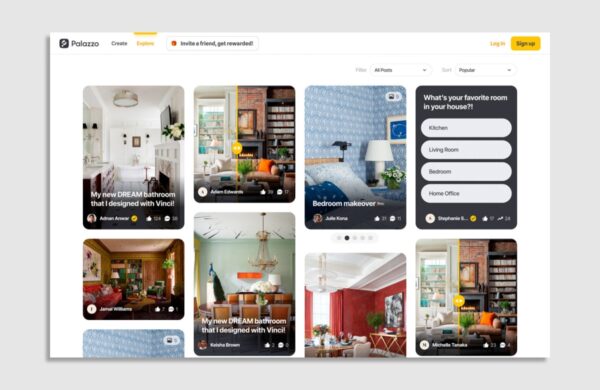In the world of interior design, the creative possibilities seem limitless, but finding the perfect vision for your space can often feel like an elusive dream. Enter Palazzo, the innovative AI-powered platform spearheaded by tennis legend Venus Williams. Launched recently, Palazzo promises to revolutionize the way people approach interior design, making it more accessible, intuitive, and fun than ever before.

“Our vision is to create a space where everything home is in one place,” Williams told Fast Company in a recent interview.
Palazzo, which launched in beta in December 2023, is not just another interior design app; it represents a convergence of cutting-edge technology and design expertise. At its core, Palazzo utilizes artificial intelligence to generate personalized design ideas based on user preferences and input.
Here’s how it works: Users upload a photo of the room they want to redesign, engage in a conversation with Vinci, the AI-powered assistant, and Palazzo transforms the space.
Vinci analyzes user input to understand style preferences, such as mid-century modern versus minimalist chic, and generates renderings that align with the user’s vision. Users can refine their designs by providing feedback and making adjustments, allowing Vinci to learn and adapt to their unique aesthetic preferences over time.

While many design platforms come with hefty price tags, Palazzo offers users a range of pricing options, starting with a free trial and affordable credit bundles for additional design iterations. This democratization of design tools empowers users of all backgrounds to unleash their creativity and envision their dream space without breaking the bank.
Users are restricted to a limited number of free design iterations. Initially, they receive around 10 opportunities to refine their designs without incurring extra charges, according to Tech Crunch. Palazzo offers four distinct bundles for additional credits, ranging from $5 for 20 credits, $20 for 100 credits, $40 for 250 credits, to $75 for 500 credits. Additionally, a referral program rewards users with five tokens whenever they refer someone to the platform who subsequently creates an account.
So What’s It Costing Venus to Launch?
There isn’t any information so far on how much Williams, who has an estimated net worth of $95 million, has invested in the startup. Her co-founders are Raffi Holzer, who founded the construction tech company Avvir, and angel investor Edward Lando, who sits on board of Misfits Market, which saves and sells organic produce and other food items that wouldn’t be accepted at traditional stores because of cosmetic imperfections.
“We want to make design fun and easy,” Williams told Fast Company. “If you talk to anyone who says, ‘I’ve just gone through a renovation,’ they’ve about had a heart attack. We don’t want that. We want people to be able to see [the design], feel confident about it, and have fun with it.”
Regarding the platform’s revenue model, the team has no intention to monetize its rendering credits. “Unless you’re a professional, we believe that online services should be freely accessible,” Holzer told Fast Company. “This aligns with the general expectation of the public. While some companies may oppose this trend, I prefer not to go against human nature.”
Instead, Palazzo will generate revenue by providing links to purchase furniture similar to those featured in the generated scenes. This referral system could extend to various products and services related to home renovations.
“Ultimately, we want people to just be able to access design,” says Holzer. “And the way we can make money is we’re creating this multisided marketplace.”
As far as competition from other similar apps ad startups, Williams isn’t worried.
“I’ve always had a philosophy: there’s room for everyone if you have something to say. We absolutely have a lot to say. And the truth is, we’re passionate about this, we love design. It’s literally our happy place,” says Williams. “We’ve just found this space where a lot doesn’t exist. And we get to have our say on it and make that mark.”
Williams did note that it has been an adjustment working with AI.
“When we first started, we had to teach the platform what [cloud couch] meant. They’re so popular right now,” Williams told Tech Crunch. “So those kinds of things are definitely important from an industry standpoint and to really be on top of what people love and what’s trending. Last year, there was a big thing about the color peach that was trending… So being ahead of that curve and making sure that we’re teaching our language model what that means.”
Palazzo also fosters a diverse community of creators.
“AI is known for ripping off creatives. If you’re a creative, you put your IP out into the world and that large language model will scan what you’ve created without your consent or even your knowledge and certainly without any remuneration. The model we’ve created here is this concept of a design imprint. So, if somebody wants to create their room in V Starr style, our design engine can produce that aesthetic within somebody’s space. But V Starr then gets compensated if any transactions are made on the platform,” Holzer explained to Tech Crunch.
Williams added, “We’re pro-human touch. To me, I feel like AI is a tool for efficiency and creativity, but we still want the human interaction. I don’t think we can forget that in life.”
Williams isn’t new to the interior design space. More than two decades ago, in 2002, she founded the interior design firm V Starr. The company has completed such projects as Chicago’s Midtown Athletic Club and the PGA National Resort Spa in Palm Beach Gardens, Florida.
In other ventures, she recently founded the plant-based food startup Happy Viking.
But, according to Fast Company, she also put a pause on her fashion brand, Eleven, in February.



